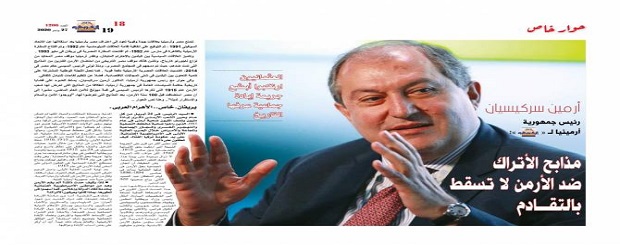
The crime of the Armenian Genocide has no statute of limitations. President’s interview with Al Ahram
June 27, 2020
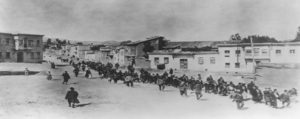
Exclusive interview of the President of the Republic of Armenia Armen Sargsyan: The crime of the Armenian Genocide has no statute of limitations. The Ottomans carried out the most horrific genocide in history
Al-Ahram was founded in 1875. : It is published in 1 million copies a day.
An official from the Public Relations Department of the Office of the President of the Republic of Armenia told Armenpress that in the preface of the interview the newspaper writes:
The official relations between Egypt and Armenia are characterized by good and strong features, which began in 1991. After the recognition of Armenia’s independence by Egypt. Then, in 1992. An agreement on the establishment of diplomatic relations was signed between the two countries. 1992 The Embassy of the Republic of Armenia in Cairo started operating in September 1993. The Egyptian embassy opened in Yerevan in May 2010.
The political relations between the two countries are based on mutual respect. Armenia appreciates Egypt’s neutral stance on the Nagorno-Karabakh conflict, as it appreciates Egypt’s historic stance on accepting Armenians who escaped the massacres and integrating them into Egyptian society. In 2013, when he assumed the post of President of Egypt, N. G. President al-Sisi’s Egyptian-Armenian relations have gained momentum. The Intergovernmental Commission is working to develop cooperation between the two countries in various economic fields, as well as to organize cultural exchanges.
Below we present an exclusive interview with N. G. With the President of the Republic of Armenia Dr. Armen Sargsyan, where he refers to 1915. The historical issues related to the massacres of the Armenian people and the policy pursued by the Republic of Armenia in that direction. Last year, at the Munich Security Summit, he and President Sisi addressed the issue, emphasizing that 100 years ago Egypt hosted Armenians who had been massacred, “where they found security, peace and stability.”
Yerevan, exclusive to Al Ahram.
QUESTION. Mr. President, every year on April 24, the Armenian people celebrate the 1915 Genocide around the world. The memory of the 1.5 million victims of the Armenian Genocide who fell victim to World War I in the Ottoman Empire through the deportations, massacres, violence, starvation and disease of the Armenian population organized by the Young Turk government. What would you say about that?
ANSWER: More than a century has passed since 1915-1923. The crimes committed against humanity and civilization, but the consequences of this crime are still felt and hinder the normal development of Armenia.
In fact, the massacres of Armenians in Ottoman Turkey began in 1894-96. During the reign of Sultan Abdul-Hamid II, 300 thousand people were killed. Armenian. The great powers of the time, the world press and celebrities, including the Prime Minister of the United Kingdom William Gladstone, the French politician Jean Jorres, the writer Anatole France, the German missionary Johannes Lepsius and others, and those who raised their voices in protest, promised to do so. In Western Armenia, which was supposed to ensure the respect of the basic civil rights of Armenians, the inviolability of life and property, but they could not stop Sultan Abdul-Hamid.
Entente countries, the Vatican, and diplomats accredited to Turkey, including U.S. Ambassador Henry Morgenthau, also did not deter the Young Turks, who improved the mechanism of extermination of Armenians by bringing it to a state-planned and genocidal genocide. Taking advantage of the opportunity provided by World War I, the Young Turk government in 1915-16. He launched a program to completely eliminate Armenians in Turkey, undertaking unprecedented deportations, atrocities, and killings. (Russia, France, and the United Kingdom issued a joint statement on May 24, 1915, describing them as a “crime against humanity and civilization.” :
After the end of the First World War, the new leader of Turkey Mustafa Kemal continued the work of his predecessors, eliminating the last remnants of the Armenians in Cilicia and Western Armenia and unleashing a war against the young Republic of Armenia.
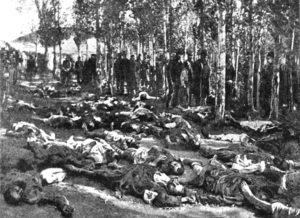
QUESTION. Why and how did it happen? After all, Ottoman Armenians have been lawfully serving that country for centuries and contributing to its development. How did they hinder the Turks?
ANSWER: That’s the question. How. Witnesses – diplomats, military, military doctors, missionaries, politicians, international media, etc. – have left undeniable evidence of the mechanisms of the genocide and the mechanisms by which it was carried out. Later, academic circles, historians and genocide scholars, based on archival documents, described and confirmed it in detail. The world is well aware of that.
I would like to focus on the causes and consequences of the Genocide. Let me single out some of the reasons.
The first was political. 1878 The “Armenian Question” raised at the San Stefano and Berlin conferences was to be logically concluded by the establishment of Armenian autonomy over the territories of historical Armenia, laying the groundwork for Armenia’s further independence.
This was opposed by the sultanate and then the republican Turkey, because in case of Armenia’s independence, the strategic part of the empire was torn from the body of the empire, which blocked the way for the Turks to the Caucasus and Central Asian countries.
By the way, the superpowers of the time lost their interest in the prospect of creating an independent state by an active and entrepreneurial nation like the Armenians on such territories. They would not refuse in 1920 in Lausanne. According to the section of the Treaty of Peace of August 10, 2006 concerning Armenia, which established Armenian sovereignty over the Armenian provinces of Ottoman Turkey with access to the Holy Sea.
The interests of Armenia and the Armenian people were ignored in 1921. According to the Moscow-Kars agreements, which gave the Armenians a small territory. Armenia was divided, the provinces of Kars and Ardahan were ceded to the Kemalists. On the other hand, Nagorno-Karabakh and Nakhichevan arbitrarily surrendered to the administrative administration of Soviet Azerbaijan, which created a source of domestic strife and conflict in our region, which we are witnessing today.
The other reason for the genocide was ideological. The newborn Turkish nationalism wanted to turn the huge multinational and multicultural empire into a monolithic and monolithic Turkish state, with its political advancement towards the Caucasus and the vast and rich territories of Central Asia. The main obstacles on that path were again the Armenians living between the two territories, as well as the Greeks and other Christians living in Asia Minor.
Therefore, the ethnic cleansing of the Greeks and Armenians, the two most active elements of the empire, had no alternative for Turkish nationalists. The two peoples who created and inherited the Byzantine civilization, who dedicated their talent and energy to the development and flourishing of the Ottoman Empire.
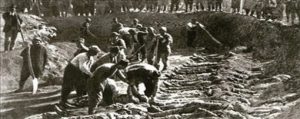
QUESTION. However, it is said that the Armenians did not have enough resources to create an independent state, like, say, other peoples of the empire that gained independence.
ANSWER: This is not the case at all, and the Turks knew it best, and not only them.
From the 17th to the 18th centuries, Armenians had a program and a constitution for the establishment of autonomy, even the restoration of statehood. Since then, political groups have been active, turning into political parties in the second half of the 19th century. Since the beginning of the 16th century, printing houses and publishing houses have been established, and in the 18th century, the national press has been widely discussed about the political destiny and future of Armenia and the Armenian people. Training personnel from various fields were trained in Russia and Europe.
In the field of economy, Armenians were very active and influential not only in the territories of the Ottoman and Russian Empires, where their historical homeland was located, but also in the East, the vast territories from North to South, where they became an insurmountable factor due to their entrepreneurship. and Development of Economic and Economic Relations.
The founders of the banking system in Southeast Asia were the Sargis family, the Lazarian dynasty in Russia, the Gulbenkians in the Middle East and Europe, and the Yesayans in the Caucasus, Alexander Mantashov in the Caucasus, and others. Huge capital was accumulated in their hands. This capital was financed by a wide network of Armenian educational institutions, psycho-cultural centers, hospitals, youth and sports institutions.
Armenians, as an ancient people with traditions of statehood, had effective self-government bodies, not only in these two empires, but also from the East to the Land of their residence. Many of them held senior military, diplomatic, and administrative positions in various countries.
In order to maintain the internal and external peace of the future country, the Armenians also had skilled officers, commanders, generals, private soldiers and volunteer regiments trained in the Balkan and Caucasian battles, who later demonstrated their military skills during the First and Second World Wars.
He had enough human resources. Demographically, Armenians made up a significant number of Armenians in the Ottoman Empire and the Caucasus and were comparable to other peoples, some of whom even surpassed them. That is, before World War I, Armenians had all the prerequisites to form an independent state. After the genocide, the Armenians were able to stand up and build a modern developed country on a piece of the historical homeland. During World War II, Armenian soldiers, generals, and marshals made a name for themselves on all fronts in the fight against fascism. Nowadays, their grandchildren selflessly defend the right to live freely and independently in Artsakh.
Today, Armenia is uniting with Artsakh and the organized and influential Diaspora of Armenia, the descendants of the Armenians who stood on the brink of extinction 100 years ago.
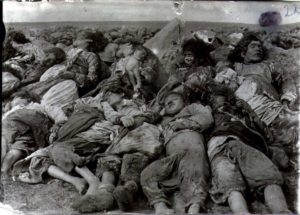
QUESTION. Mr. President, more than a century has passed since the Genocide, and no matter how hard the losses are, some say it is a thing of the past and we must look to the future.
ANSWER: Our focus is on the future, we dream of the future, we plan that future, we work every day to build the future. But let’s remember that the future is the continuation of yesterday and today.
We often talk about huge human and material losses. And that’s right. The loss of 1.5 million people significantly affected the further reproduction of the Armenian people. Under normal circumstances, we should not be 10-12 million today, but at least twice as many.
Another major loss that successive Turkish governments sought was the complete elimination of the Armenian element from historic Armenian territories. Today, there are no other Armenians living in those territories. And if there are no people, then there is no language, customs, way of life, culture, cuisine, home, with which the national environment is formed, society and people are formed.
In other words, Armenians have been deprived of the right to live on their ancestral land and to control their lives and their future through the Genocide. And keep in mind that Armenians were not a newly formed ethnic group, but a people with an old state and civilization of the world. In the decades following the genocide, traces of Armenian and Armenian civilization have been consistently destroyed in Turkey.
And if today we justly condemn the destruction of individual historical monuments by extremists around the world, how severely should we condemn and condemn in time the destruction of the material and cultural monuments of an entire nation with a history of at least millennia? Now imagine the situation of the surviving Armenians around the world, many of whom remained stateless for decades, even until the 1940s and 1950s.
By the way, during the First World War, both Armenians and allied armies fought with honor and self-sacrifice on all fronts, from Verdun to Palestine, from Brest to Trabzon and the Caucasus, and did not receive the homeland they dreamed of after the war.
Today, almost three-quarters of Armenians live in different countries, under the most diverse customs, social norms and religions. Everywhere Armenians make great efforts to preserve their identity and to speak about their rights, which they have been deprived of through the Genocide.
QUESTION. What do you think are the lessons of the Genocide, and what does humanity have to do?
ANSWER: It is unfortunate to realize that humanity has not learned a lesson from the Armenian Genocide, it has been forgotten, it has long remained unrecognized and unpunished, which could have prevented such atrocities in the history of mankind. And humanity has witnessed other genocides since then.
It is my deep conviction that the recognition of the Armenian Genocide is not only for our Armenians, but first of all it is a matter of approaching universal universal values, a matter of preventing this evil. It is with this in mind that Armenia is guided, setting one of its policy priorities in genocide prevention and taking active steps in this direction at the national and international levels. At the initiative of Armenia, the UN Human Rights Council has traditionally adopted resolutions on the prevention of genocides. The UN General Assembly again adopted a resolution on the declaration of December 9 as the International Day of Remembrance and Dignity of the Victims of the Genocide and the Prevention of Genocide.
Therefore, the issue of recognizing the Armenian Genocide by the international community “in front of Turkey” is very topical. It has several components. Debt relief, prevention of such a crime ոճ Exclusion of repetition, elimination of repercussions.
After half a century of silence, in the 1960s and 1970s, the world began to talk again about the Armenian Genocide. 1965 Uruguay was the first to recognize it. Today, many countries and international organizations recognize the Armenian Genocide, including France, Russia, the United States, Germany, Italy, Switzerland, the Vatican, and in the Arab world, Lebanon and Syria. Their number is growing.
Today, the international community has absolutely no doubts about the genocide. At the same time, it is unacceptable when the issue of recognizing the Armenian Genocide is viewed from the point of view of current economic or political interests with Ankara.
In that case, we cannot, on the one hand, declare our effective fight against xenophobia, discrimination, intolerance, anti-Semitism, denial of the Armenian Genocide and other universal evils, and on the other hand “diplomacy” on these issues.
I am convinced that it is mainly these principles that have guided the countries that have recognized the Armenian Genocide and the international organizations for which we are grateful. We are grateful to the countries that have opened their doors and given shelter to those who survived the tragedy after the Genocide. We are grateful to the missionaries, military doctors and nurses, diplomats, orphans, our unfortunate brothers, the Greeks, the Assyrians, the Jews and the Yezidis, as well as the Turkish, Kurdish and Arab families and individuals who often risked their lives and safety in those brutal days of the massacre. They helped and saved many.
Another issue is the position of successive Turkish governments: to avoid recognizing the Genocide and to pursue a policy of denial at the state level.
Today, the international community, politicians and public figures, including many Turkish intellectuals and public figures, are raising questions about the recognition of the Armenian Genocide, hoping that the Turkish authorities will face the tragic pages of their own history and turn them around. The crime of genocide has no statute of limitations. Recognition of the Armenian Genocide by Turkey and the elimination of its consequences are a guarantee of security for Armenia and the Armenian people, as well as for the region.
We cannot forget the Armenian Genocide and we cannot reconcile with it. We cannot ignore the suffering of the victims and the survivors, and we must ensure a secure and dignified future for their generations.

armenpress.am/arm/news/1019842.html:
English translation – LOUSAVOR AVEDIS:
